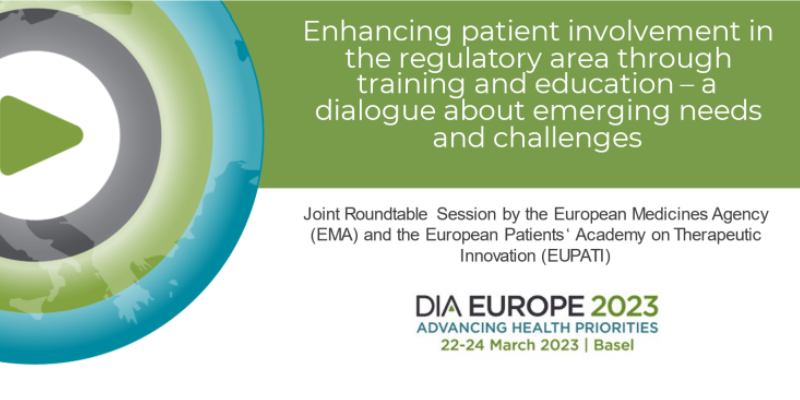
On 24 March of this year, DIA2023 held a roundtable discussion jointly organised by European Medicines Agency (EMA) and EUPATI entitled ‘Enhancing patient involvement in the regulatory area through training and education – a dialogue about emerging needs and challenges’. This session focused on the importance of greater patient involvement in medicines research and development (R&D). The discussion also highlighted the need for more patient involvement in the evaluation and authorisation of new medicines, and the monitoring of their safety benefitting all involved parties.
Patients are directly affected by decisions taken by the regulatory authorities. Patients also possess unique experience of living with a condition and therefore are in a distinctive position to inform regulatory processes about the potential positive or negative effects of new and existing health technologies. Patients can also give substantial input into how adequate and clear information about medicines is in terms of content, format and language.
Training provides patients’ with the opportunity to enhance their knowledge, skills and competencies throughout the different stages of the medicine lifecycle, e.g. marketing authorization procedures, benefit-risk assessment, pharmacovigilance, pharmacoepidemiology and other relevant aspects, helping to gain a better understanding of their role in these processes.
Today, EMA and the National Competent Authorities increasingly involve patients in their work and also provide information and support for the patient community. Training for patients in the regulatory area is provided by EUPATI as well as similar organisations and patient organisations alike. However in order to be effective and beneficial for all stakeholders, a closer look at the current level of patient involvement in the regulatory area, the related needs for education & training as well as eventual gaps is needed.
This session brought different actors together who discussed the existing efforts in patient training, identify gaps, and explore opportunities for improvement.
Main emerging themes from the session
Challenges in Patient Training and Education
The panelists highlighted the need to involve patients early on and empower them in the healthcare transformation process. They also
emphasized the importance of patient literacy and the need for resources and strategies to ensure effective training.
Streamlining Initiatives and Collaboration
The panelists discussed the potential benefits of establishing patient engagement groups to streamline initiatives between different agencies. The importance of collaboration, sharing best practices, and creating a European overview of patient engagement efforts was also emphasized.
Reaching Patients
The panelists explored strategies to reach patients who may not actively seek interaction or engagement. They mentioned the potential of utilizing social media platforms and exploring new channels to ensure inclusivity and diversity in patient engagement.
Conflict of Interest and Training
The panelists addressed the issue of conflicts of interest in patient training and stated there is a need for neutrality and objectivity in training activities. They discussed the importance of managing conflicts of interest effectively and the impact it can have on patient engagement.
Progress and Recommendations
When asked about their desired progress in patient education within a year, the panelists expressed various aspirations. These included having patient representatives involved in expert committees, identifying committed patient collaborators, gathering data on the value of patient engagement, and advocating for resources and financial support. The need for a commitment to training in action plans and recognising it as a key pillar of patient engagement was also adhered to.
Overall, the session shed light on the importance of patient involvement, challenges in patient training, collaboration among agencies, reaching a wider patient population, managing conflicts of interest, and the desired progress in patient education.
Download the full session report below.
Date posted: October 3, 2023
Categories: Uncategorized



